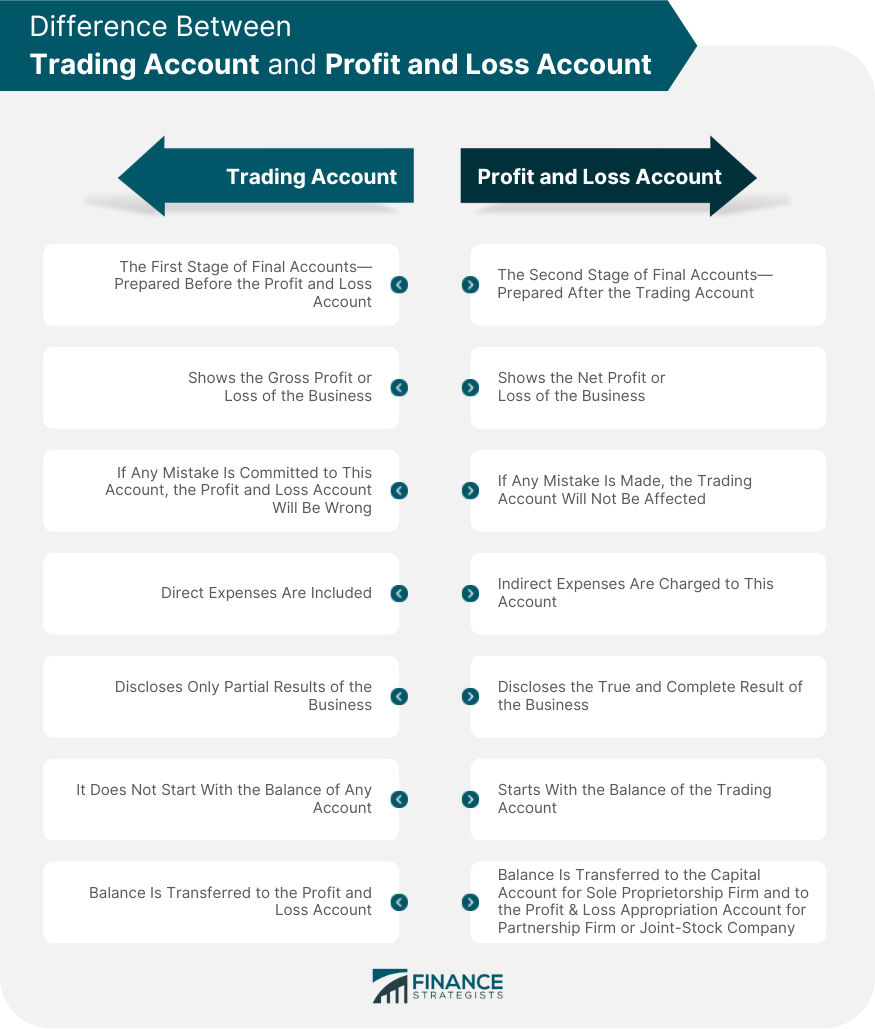A summary of the differences between a trading account and a profit and loss account is given below.
Trading Account
Profit and Loss Account
Preparing a trading account is the first stage of final accounts—prepared before the profit and loss account
The second stage of final accounts—prepared after the trading account
Shows the gross profit or loss of the business
Shows the net profit or loss of the business
If any mistake is committed to this account, the profit and loss account will be wrong
If any mistake is made, the trading account will not be affected
Direct expenses such as expenses connected with purchases, production of goods, and expenses incurred to bring goods to a salable condition are included
Indirect expenses such as expenses relating to sales and administration of business are charged to this account
The true results of the business cannot be ascertained using this account—it discloses only partial results of the business
It discloses the true and complete result of the business
It does not start with the balance of any account
It starts with the balance of the trading account
The balance of this account is transferred to the profit and loss account
The balance of this account is transferred to the Capital Account in the case of a sole proprietorship firm and to the Profit & Loss Appropriation Account in the cases of a partnership firm or joint-stock company

Difference Between Trading Account and Profit and Loss Account FAQs
A Trading Account shows the gross profit or loss of a business. It is also called as goods account. The goods purchased for resale with their related expenses are debited in this account and goods sold with their related income is credited to the trader's Trading Account.
Profit and loss account shows the net profit or loss of a business. It is also called as income & expense account. Expenses connected with purchases, production of goods, expenses incurred to bring goods to salable condition are charged in this account whereas expenses connected with sales and administration is credited to this account.
Trading Account shows gross profit or loss, whereas profit and loss accounts show net profit or loss. A Trading Account does not start with the balance of any particular account whereas the profit and loss account starts with the balance of a Trading Account. The balance of a Trading Accounts is transferred to a profit and loss account.
The purpose of a Trading Account is to disclose the gross profit or loss arising from purchase and sale transactions alone. It does not show expenses relating to production, administration etc. Since this account shows only purchase and sale transactions, it does not reflect the true results of the business.
There are two types of Trading Accounts, namely, purchases account and sales account. Both these accounts contain similar information but shows different results for a given period.
True Tamplin is a published author, public speaker, CEO of UpDigital, and founder of Finance Strategists.
True is a Certified Educator in Personal Finance (CEPF®), author of The Handy Financial Ratios Guide, a member of the Society for Advancing Business Editing and Writing, contributes to his financial education site, Finance Strategists, and has spoken to various financial communities such as the CFA Institute, as well as university students like his Alma mater, Biola University, where he received a bachelor of science in business and data analytics.
To learn more about True, visit his personal website or view his author profiles on Amazon, Nasdaq and Forbes.













